Text
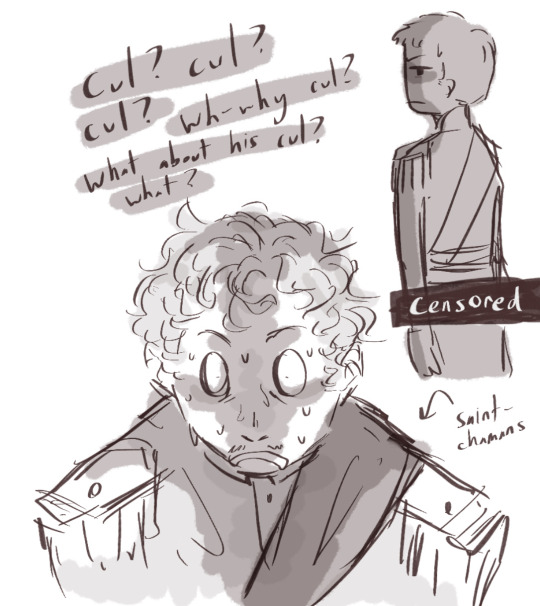


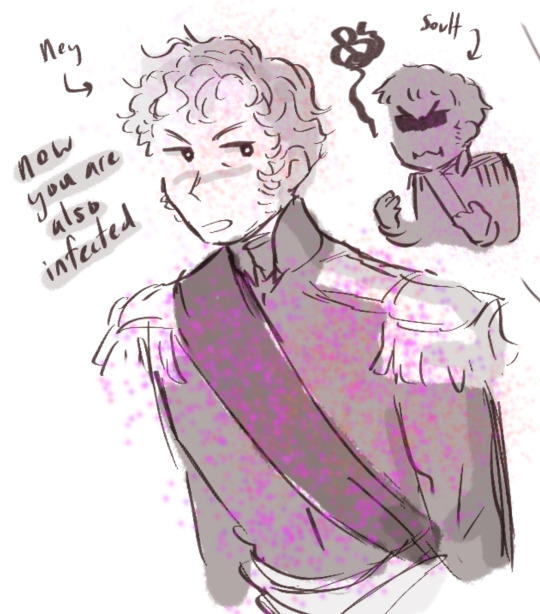
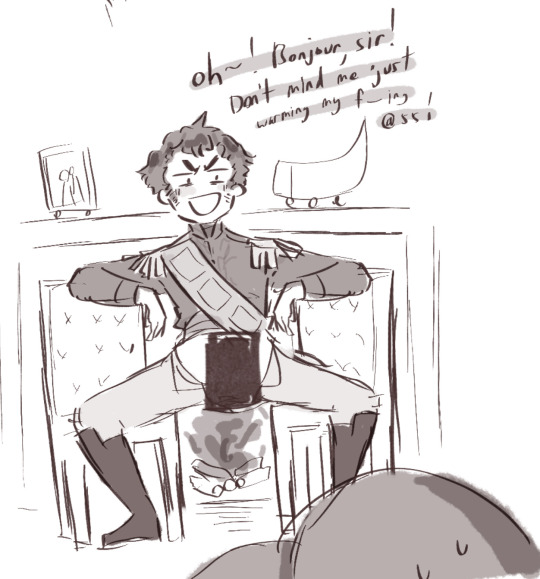




I have a huge dump of napoleonic doodles inspired by actual and RP events (can you tell which?). Some of these are really old (before hiatus) but I’ll just put them here since I don’t think I’ll ever be able to properly color them all😢
Also bonus Soult’s brain frying:
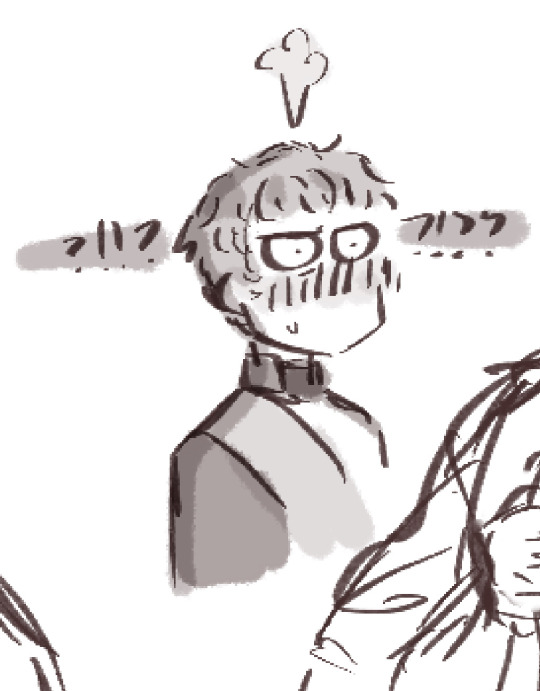
#napoleonic wars#napoleonic era#napoleon’s marshals#napoleon bonaparte#napoleonic dump#napoleonic shitpost#napoleonic RP#my art#i love how funny history can be
65 notes
·
View notes
Text
Petiet about the death of Alfred de Lameth
I still owe @cadmusfly a translation of this passage in Petiet’s memoirs. And I had totally forgotten about it. Mea culpa! Also, please bear with me, it’s rather long. But also quite gripping.
The Duke of Dalmatia had made General Quesnel governor of Oporto.
Sidenote: That’s one of the guys whom Gotteri suspects to have been in on the Argenton conspiracy.
The auditor Taboureau was intendant and Captain de la Colombière, in the service of Spain and the marshal's interpreter, had just been appointed by him as Spanish consul in this city.
And if this post wasn’t too long already, I would love to comment on the ways Soult apparently set up his makeshift administration:
Colombière, aren’t you basically a Spaniard? Excellent, consider yourself transfered to diplomatic service as the new Spanish consul.
La Colombière: Uhm… and what are my duties as consul of Spain?
Chorus of ADCs chanting in the background: Par-ty, par-ty, par...
On 11 April, the day of his inauguration, Monsieur de la Colombière gave a dinner for the army's general staff. General Ricard, chief of staff, attended, as did the aides-de-camp and officers of the Duke of Dalmatia.
Notably missing: The Duke of Dalmatia. Which makes me wonder if this wasn’t another Go get drunk elsewhere! incident...
Captain Choiseul-Beaupré, Franceschi's aide-de-camp, and Alfred Lameth, who were due to leave the next day to see this general, were present at the party, which was very merry and lasted until four in the morning. Eugène Choiseul, […]
That’s a different member of this illustrious family, and another of Soult’s aides.
[…] addressing his cousin and Lameth, told them that the route they were about to take was safe and that he had just taken it alone and without a guide. Lameth observed that in Portugal a road was only safe up to the moment at which no one had yet been murdered on it. The disastrous event which took place on the 13th proved only too well the truth of his answer.
And of course, knowing this, the most professionel approach is to start the trip worn out, without sleep and drunk as a skunk. But at least they're finally on their way and I can refrain from any further comments.
Choiseul-Beaupré and Lameth, tired from the night they had spent with the new Spanish consul, instead of going to Franceschi's headquarters the same day, stopped at Villa de Feira, four leagues from Oporto. A convoy of clothing, escorted by dragoons, had just arrived there. The next day, the 13th, the two officers preceded the convoy, which was moving slowly, and they asked to be followed by two dragoons. They had just passed the village of Arrifana when they entered a sunken road, the narrowness of which meant that they had to march one at a time, in this order: one dragoon, Lameth, Choiseul and the second dragoon.
In the middle of the sunken road was a path that turned right and led to a village in the fields. The continuation of the road, making a slight bend to the left, led to Oliveira, one of the cantonments of General Franceschi's troops. The hills bordering the sunken road were covered in woods where fifty or so armed peasants had taken cover, no doubt waiting for the convoy. The leading dragon followed the road directly, but as Lameth took the path to the right, Choiseul shouted at him: "Lameth, you're going the wrong way!" Immediately, a shower of musketry killed Alfred de Lameth and Choiseul's horse. The second dragoon fled towards Arrifana, while the first abandoned his horse and ran towards Oliveira amid renewed shooting and a hail of stones thrown at him by the insurgents from the top of the hill.
Choiseul had his foot caught under his horse. As he tried to remove it, he was hit by a bullet that slightly injured his ear. Choiseul redoubled his efforts, managed to free his leg, got to his feet, ran across the land to the left of the road in the direction of Oliveira and crossed a river at the foot of a hamlet. The armed peasants then ran down the hill like a torrent and followed in his footsteps. Choiseul only had time to reach the first house in the hamlet and ask an old man to save him.
The insurgents entered the cottage, seized Choiseul and took his watch and money. Soon there was a quarrel between the brigands over the division of the spoils and Choiseul, who noticed the compassionate eyes of the old man, hoped that the discussion between his attackers might save his life. But he was taken to a plain near the cottage to be shot. He saw a large number of inhabitants of both sexes gathered there. Choiseul shouted to them in their language that he did not recognise Portuguese honesty in the conduct of those who wanted to immolate a defenceless man. He added that, according to the laws of war, he should regard himself as their prisoner and not their victim. He ended by telling the inhabitants that if his blood were spilt, they would have to fear the most terrible vengeance.
The Portuguese, astonished to hear a Frenchman explain himself in their idiom with as much ease as energy, stopped, grouped together, talked amongst themselves and soon beckoned Choiseul to follow them. They returned to the house where he had been arrested. The old man wants to give him back his purse and his watch. The money is found but the watch has disappeared. The old man says to Choiseul: "You have not been arrested by soldiers of our nation, but by highway robbers. We are going to give you six of us to take you to your people. You should not even consider yourself a prisoner."
However, the first dragoon arrived breathless at Oliveira and told General Debelle, who was in command there, that chef d'escadron Lameth had just been murdered and that Captain Choiseul was in the greatest danger. Tholozé, aide-de-camp to the marshal, […]
Yes. Another one. Brun’s Cahiers have a report by him about what happened during the evacuation of Oporto, when Wellesley attacked.
[…] was returning to Oporto and was close to the general. He assembled a detachment of dragoons and galloped towards the scene of this deplorable event. The six peasants escorting Choiseul saw the French arrive at full speed. They paled and thought they had arrived at their final hour. Choiseul reassured them, ran to meet Tholozé and shouted at him to spare his liberators. Lameth's body is found and he is taken away to perform the last services.
As soon as the Marshal, who was very fond of Alfred, learned of his assassination, he ordered the Thomières infantry brigade to go to Arrifana, to gather the old men, women and children in the church and to burn the village. General Thomières went to Arrifana to carry out this fatal mission. The village leaders came to meet the General and told him that the fifty culprits, strangers to Arrifana, had been arrested and would be handed over to him. General Thomières then took it upon himself to change the order he had received. The village was respected and the fifty brigands were hanged in front of the church.
So, according to Petiet, the village was not burned in the end. That’s somewhat in accordance with Soult’s memoirs, who claims to only have ordered to find and execute the murderers und to have their houses burned. Petiet, however, was sent on another mission the day after Lameth had left Oporto and can only have learned of all these events later, most likely from the ADC Choiseul, with whom he was close friends, as he states in his memoirs.
There you have my very belated translation. Sorry for the delay 😥.
#jean de dieu soult#auguste petiet#alfred de lameth#napoleonic wars#napoleonic era#i really enjoyed reading this#also interested in these guys!
15 notes
·
View notes
Text
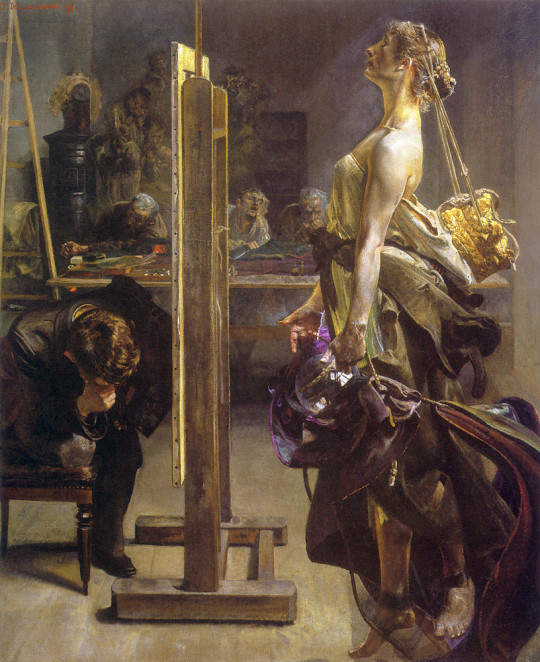
-Painter's Inspiration-
152 notes
·
View notes
Text
The cover of the cookbook I'm doing for my type final
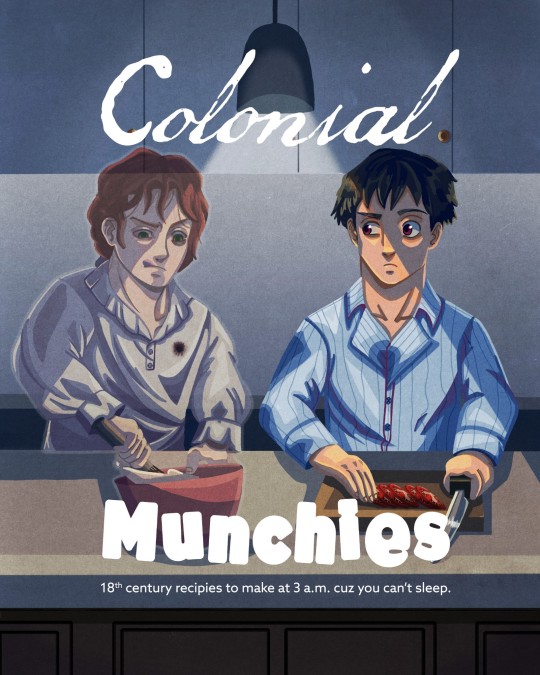
The recipes will mainly be easy and light colonial American treats one can do in the middle of the night when you're craving something to eat.
The two characters on the cover are Hamilton (left) and Felix (right). YES! I know Hamilton got shot on the right side of the abdomen but we wanted to make it obvious that Hamilton is dead, so I placed the bullet hole on his chest and made him more transparent, plus, it adds a bit of humor having the ghost of a founding father helping you cook :)
Here's some bonus drawings! :)


17 notes
·
View notes
Text
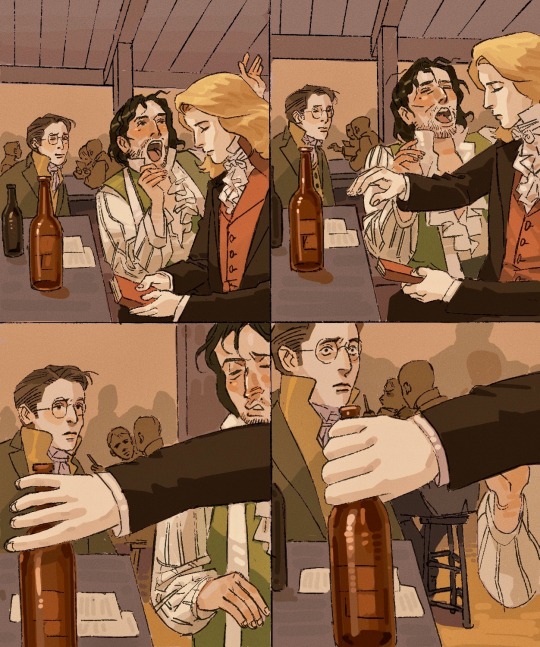
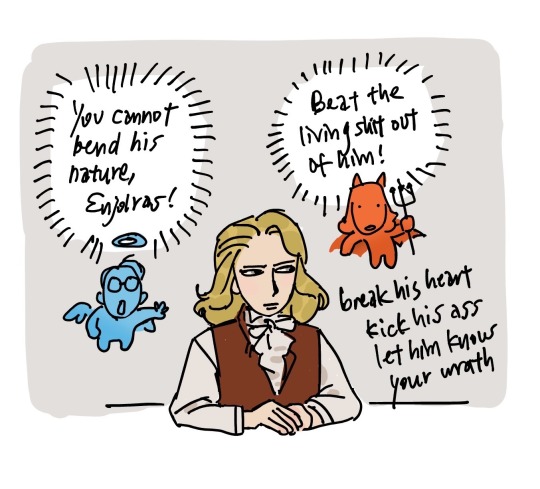
2K notes
·
View notes
Text
I made a napjuno design on gacha club and I actually liked how they turned out 🥰 MY BABIES

#napoleon bonaparte#jean andoche junot#gacha club#dawwww🤭🫶#I love their contrasting wings hehe#cute chibis#their expressions too🤭💖
25 notes
·
View notes
Photo
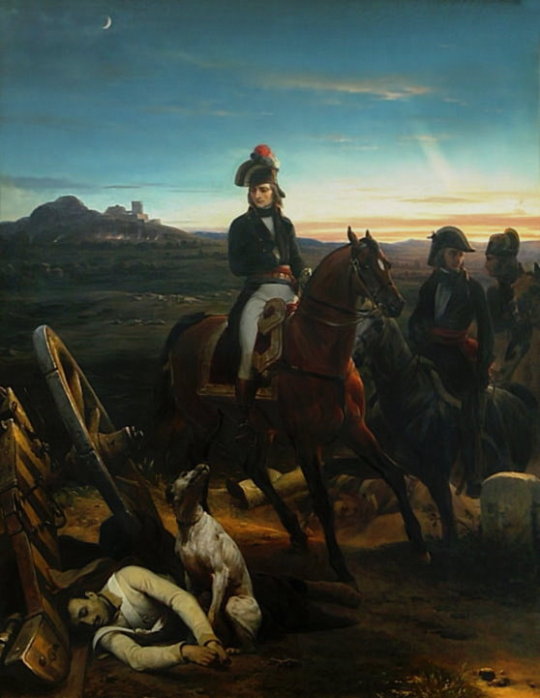
Bonaparte near Bassano by Horace Vernet,1848
“This soldier, I realized, must have had friends at home and in his regiment, yet he lay there deserted by all except his dog. I looked on, unmoved, at battles which decided the future of nations. Tearless, I had given orders which brought death to thousands. Yet here I was stirred, profoundly stirred, stirred to tears. And by what? By the grief of one dog.”
-Napoleon Bonaparte
229 notes
·
View notes
Text

Robe sword and scabbard 1802-03
In 1799 a new system of government, led by three Consuls, was introduced in France. Napoleon was elected First Consul. A sword of this pattern was provided to each of them, although this one is of a later date and must have been a replacement for the original. It was acquired by George IV with a certificate swearing that it had belonged to Napoleon himself.
310 notes
·
View notes
Text


I got inspired and drew it 😭✨
31 notes
·
View notes
Text
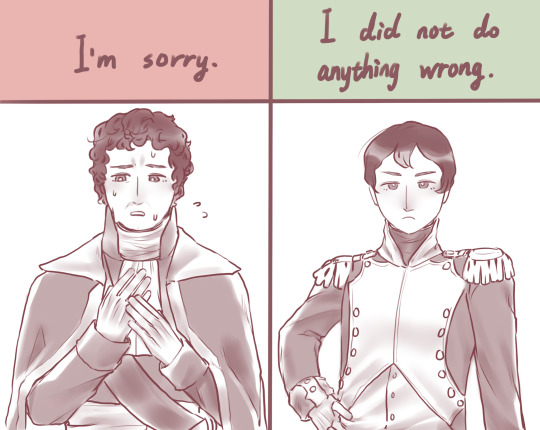
Stop using anti-self language✋️
#louis alexandre berthier#napoleon bonaparte#napoleonic wars#napoleonic era#napoleon’s marshals#napoleonic meme#HEHEHE#poor berthier…#napoleon looks sassy
92 notes
·
View notes
Text
Pauline Bonaparte

I haven't drawn a woman in a long time so I decided to draw one of my favourite Napoleonic women - Pauline!
29 notes
·
View notes
Text
MARIE-THÉRÈSE FIGUEUR // SOLDIER
“She was a French soldier who fought in the French Revolutionary Wars and Napoleonic Wars. Unlike some female soldiers before the twentieth century, she did not disguise her gender when she enlisted, serving for twenty-two years under her own name in the French Revolutionary Army and the Grande Armée.”
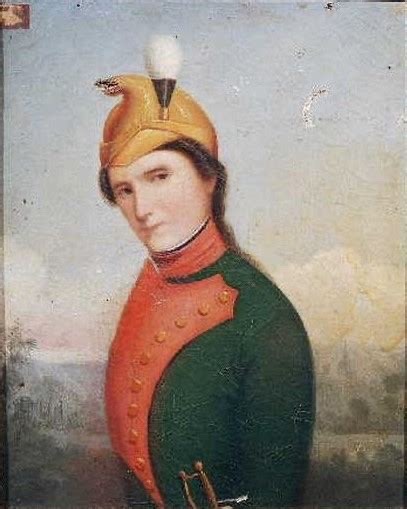
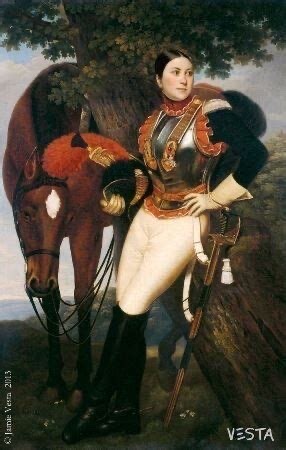
140 notes
·
View notes
Text
DO NOT reblog the silly chibi Murat, or he will suck out your intelligence (and your fashion sence).
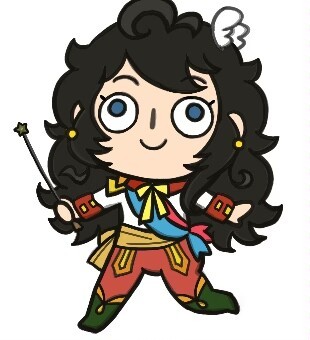
#joachim murat#napoleonic wars#napoleonic era#napoleon’s marshals#daww THIS IS SO CUTE#😂😂he looks like a intelligence vortex
60 notes
·
View notes
Text

忘记更新是一种我的问题。
#napoleonic wars#napoleon’s marshals#michel ney#jean de dieu soult#louis nicolas davout#louis alexandre berthier#andre massena#napoleon#woah! comic!!!
54 notes
·
View notes
Text
Father of the Grenadiers
For the first few years of the Empire, Oudinot was commanding grenadier divisions. His willingness to fight among the ranks and his general popularity in the army won him the everlasting affections of his men.
François Pils, Oudinot's aide/valet* from 1804 - 1814, mentions this in his military diary:
It was at the battle of Wertingen that the general first led his grenadiers to glory. Since then, they no longer called him their general, but they all called him Father.
The Battle of Wertingen was the first battle of the campaign of Ulm so it was around October 1805. It was also around this time that Napoleon would nickname this particular elite grenadier division Oudinot's Grenadiers, a name that would always accompany Oudinot whenever he would command grenadier divisions.
And this whole 'father' thing also stuck, even when Oudinot would switch between grenadier divisions like in 1807 during the siege of Danzig when he was commanding a joint division of grenadiers and voltigeurs:
Not a day went by without fighting; either the French attacked, or they were warned by the Russians on the 19th in the morning the enemy made a new effort and rushed en masse from the Pharwassen into our lines. Warned by the sound of cannon fire, the general arrived at a gallop and, just as he was leading a column of grenadiers after him, a cannonball took the head of his horse; the animal rolled to the ground, dragging its rider with it, amidst a clamour of despair that came from all the chests: the grenadiers believed that their general had just been killed! But this movement of anxiety did not last long: the general got up at once and mounted a new horse which I presented to him. Then, from all sides, enthusiastic cries were heard: "Long live General Oudinot! Long live our father!"...
Wow...besides Napoleon, I don't think I've ever read of such a display for any other general/marshal. They really did love him.
Pils, F., & Cisternes, R. de. (1895). Journal de Marche du Grenadier Pils: (1804-1814). Ollendorff.
*Pils was not Oudinot's ADC, he was never conferred that position. It's been hard to find out what exactly was Pils' role as part of Oudinot's staff since he was just a private soldier who Oudinot just took under his wing.
Original French:
C'est au combat de Wertingen que le général conduisit pour la première fois ses grenadiers à la gloire. Depuis, ils ne l'appelèrent plus leur général, mais tous lui laissèrent le surnom de Père.
Il ne se passait plus de jour sans combat; soit que les Français attaquassent, soit qu'ils fussent prévenus par les Russes le 19 dès le matin l'ennemi fit un nouvel effort et s'élança en masse du Pharwassen dans nos lignes. Averti par le bruit du canon, le général arrive au galop et, à l'instant où il entraînait une colonne de grenadiers à sa suite, un boulet emporte la tête de son cheval; l'animal roule à terre entraînant son cavalier , au milieu d'une clameur de désespoir qui sort de toutes les poitrines: les grenadiers croient que leur général vient d'être tué!…Mais ce mouvement d'inquiétude ne fut pas de longue durée: le général se relève aussitôt et enfourche un nouveau cheval que je lui présente. Alors, de toutes parts, des cris enthousiastes se font entendre: «Vive le général Oudinot! Vive notre père!»...
#happy birthday marshal#nicolas charles oudinot#napoleonic wars#napoleonic era#napoleon’s marshals#oudinot as father :’)
18 notes
·
View notes
Text
Citizen Cooks in the Age of Napoleon
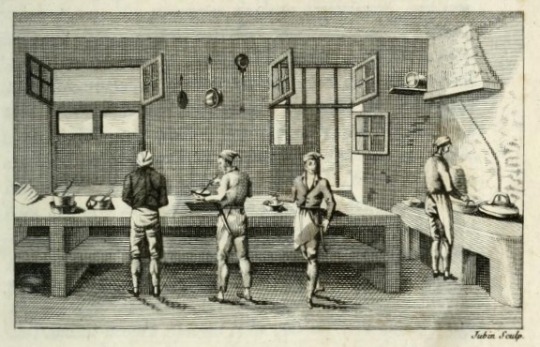
Excerpt about the role of cooks in France after the abolition of culinary guilds, and how they navigated a world which demanded for them to find new ways to stay relevant and prosperous. From Defining Culinary Authority: The Transformation of Cooking in France, 1650-1830 by Jennifer J. Davis:
French cooks sought new sites upon which to rebuild the authority of culinary labor. Throughout the early nineteenth century cooks increasingly adopted scientific terms to demonstrate their reliability and profound knowledge of the culinary arts. Such language communicated the author's education and distinction, just as an appeal to an elite patron had done in the 1660s and referral to a cook's professional expertise had done in the 1760s. The rhetoric and institutions of scientific knowledge also provided a means of distinguishing men's work from women's in the post-revolutionary era. During the early nineteenth century, cooks' claims to scientifically valuable savoir-faire rested on three crucial points of culinary innovation: food preservation, the improved production of bouillon, and gelatin extraction.
As these processes left the realm of traditional knowledge and became sites of scientific inquiry by tradespeople and amateurs alike, cooks sought to maintain authority in this arena by including scientific terms and theories in cookbooks, advertisements, and government petitions.
Two factors encouraged cooks' claims to scientific knowledge during this era. First, when Napoleon Bonaparte took the reins of government as first consul in 1799 and established himself as emperor in 1804, he raised medical doctors and academic scientists, Idéologues, to positions of political prominence. From these posts, the Idéologues subsidized experiments and inventions deemed useful to the nation and encouraged the popularization of science in the public sphere through state sponsorship of exhibitions and print forums. The Idéologues particularly supported research related to food preparation and preservation that might benefit France's armies and navies, with obvious benefits for professional cooks. Many cooks presented their particular techniques to the government during this time, seeking both financial recompense and public acclaim. Second, a voluntary association closely allied with the Idéologues' vision, the Société d'encouragement pour l'industrie nationale (Society for the Encouragement of National Industry), provided a forum in which formally trained scientists, politicians, merchants, artisans, and curious educated men might unite to address questions that inhibited French science and industry.
Together, these men sought to develop a more coherent program for industrial advancement than any one group could achieve independently. The society explicitly sought to join scientific knowledge to artisanal practical expertise, recognizing that each group had strengths that would benefit industrial development. This association invested heavily in three diffuse projects that eventually infused the most basic culinary processes with scientific awareness: new methods of food preservation to benefit the nation's armies and navies, new methods of stock preparation to sustain the nation's poor, and new methods of extracting gelatin from bones to improve hospital and military diets at little added expense.
#napoleonic era#napoleonic wars#illustration from l'art du cuisinier by antoine beauvilliers (1814)#cooking history
28 notes
·
View notes
